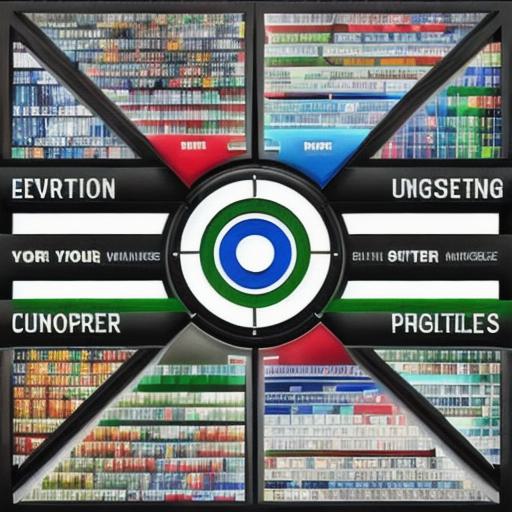In today’s digital age, marketing has become more important than ever before. With the rise of social media, search engines, and online advertising, businesses have an unprecedented opportunity to reach their target audience on a global scale. However, with so many options available, it can be overwhelming for business owners to know where to start.
In this comprehensive guide, we will explore the most effective modern marketing techniques for businesses. From SEO to social media, we’ll cover everything you need to know to create a successful marketing strategy that drives traffic and generates leads.
1. Search Engine Optimization (SEO)
Search engine optimization (SEO) is the process of optimizing your website to rank higher in search engines like Google. By improving your website’s visibility on search engines, you can attract more organic traffic and increase your chances of converting visitors into customers.
Here are some key elements of a successful SEO strategy:
- Keyword research: Identify the keywords that your target audience is using to search for products or services like yours, and optimize your website’s content around these keywords.
- On-page optimization: This includes optimizing your website’s title tags, meta descriptions, header tags, and alt tags for targeted keywords.
- Content creation: Create high-quality, valuable content that targets your keywords and engages your audience. This can include blog posts, videos, infographics, and other types of content.
- Backlink building: Build high-quality backlinks to your website from relevant and authoritative sources. This helps improve your website’s credibility and search engine rankings.
2. Social Media Marketing
Social media marketing is the use of social media platforms like Facebook, Twitter, LinkedIn, and Instagram to engage with customers, promote products or services, and build brand awareness. Here are some key elements of a successful social media marketing strategy:
- Define your target audience: Identify the demographics and interests of your ideal customer, and tailor your content and messaging accordingly.
- Create a content calendar: Plan out your social media content in advance to ensure consistency and maximize engagement.
- Use visual content: Visual content like photos and videos are highly engaging and can help you stand out on social media.
- Leverage paid advertising: Consider using paid advertising on social media platforms to reach a larger audience and drive more traffic to your website.
3. Email Marketing
A PLACE FOR A PICTURE #2
Email marketing is the use of email to promote products or services, engage with customers, and build brand loyalty. Here are some key elements of a successful email marketing strategy:
- Build an email list: Collect email addresses from customers through forms, pop-ups, and other methods.
- Segment your email list: Divide your email list into groups based on interests, behaviors, and demographics to ensure that you’re sending relevant content to each group.
- Create valuable content: Craft engaging and informative emails that provide value to your customers. This can include product recommendations, promotions, and educational content.
- Use personalization: Personalize your emails with the recipient’s name, location, and other relevant information to make them feel more special.
4. Content Marketing
Content marketing is the creation and distribution of valuable, relevant, and consistent content to attract and engage a clearly defined audience, and drive profitable customer action. Here are some key elements of a successful content marketing strategy:
- Define your target audience: Identify the demographics and interests of your ideal customer, and create content that speaks directly to their needs and pain points.
- Create a content plan: Outline the types of content you’ll be creating, the topics you’ll cover, and the channels you’ll use to distribute your content.
- Focus on quality over quantity: Prioritize creating high-quality, valuable content that provides real value to your customers. This can include blog posts, videos, infographics, and other types of content.
- Measure and analyze: Track the performance of your content using analytics tools like Google Analytics, and use this data to refine your strategy and improve your results.
5. Influencer Marketing
Influencer marketing is the partnership between a business and an individual or group with influence over potential customers. Here are some key elements of a successful influencer marketing strategy:
- Identify relevant influencers: Find influencers who have a large following in your industry or niche, and whose audience aligns with your target market.
- Develop a clear campaign strategy: Outline the goals of your campaign, the type of content you’ll be creating, and the metrics you’ll use to measure success.
- Build relationships with influencers: Reach out to influencers and propose a partnership that aligns with their interests and values.
- Monitor and analyze results: Track the performance of your influencer marketing campaign using analytics tools like Google Analytics, and use this data to refine your strategy and improve your results.
6. Video Marketing
Video marketing is the creation and distribution of videos to engage, educate, and entertain customers. Here are some key elements of a successful video marketing strategy:
- Define your target audience: Identify the demographics and interests of your ideal customer, and create videos that speak directly to their needs and pain points.
- Create a content plan: Outline the types of videos you’ll be creating, the topics you’ll cover, and the channels you’ll use to distribute your videos.
- Focus on quality over quantity: Prioritize creating high-quality, engaging videos that provide real value to your customers.
- Measure and analyze: Track the performance of your videos using analytics tools like YouTube Analytics, and use this data to refine your strategy and improve your results.
7. Mobile Marketing
Mobile marketing is the use of mobile devices like smartphones and tablets to engage with customers and promote products or services. Here are some key elements of a successful mobile marketing strategy:
- Optimize for mobile: Ensure that your website and content are optimized for mobile devices, with fast loading times and easy navigation.
- Use mobile apps: Consider developing a mobile app to provide a more personalized and streamlined experience for your customers.
- Leverage SMS and MMS: Use SMS and MMS messaging to communicate with customers in real-time, and promote special offers and promotions.
- Monitor and analyze: Track the performance of your mobile marketing campaigns using analytics tools like Google Analytics, and use this data to refine your strategy and improve your results.
FAQs
1. What is the most effective way to reach my target audience?

The most effective way to reach your target audience will depend on their demographics, interests, and online behaviors. You may want to consider using a combination of search engine optimization (SEO), social media marketing, email marketing, content marketing, influencer marketing, video marketing, mobile marketing, or other techniques to reach your target audience.
2. How do I measure the success of my marketing campaigns?
You can measure the success of your marketing campaigns using a variety of tools and metrics, including website traffic, conversion rates, social media engagement, email open and click-through rates, content views, and more. You should regularly track and analyze this data to refine your strategy and improve your results.
3. How do I create a successful content plan?
To create a successful content plan, you’ll need to define your target audience, identify the topics and types of content that will appeal to them, and choose the channels where they are most active. You should also prioritize creating high-quality, engaging content that provides real value to your customers. Finally, you should regularly track and analyze the performance of your content using analytics tools like Google Analytics.
4. How do I find relevant influencers for my brand?
To find relevant influencers for your brand, you can use tools like Instagram’s search feature, or platforms like Influencer.co or HypeAuditor to identify influencers who have a large following in your industry or niche, and whose audience aligns with your target market. You should also reach out to influencers directly and propose a partnership that aligns with their interests and values.
5. How do I optimize my website for mobile devices?
To optimize your website for mobile devices, you’ll need to ensure that it is fast loading, easy to navigate, and has a responsive design that adjusts to different screen sizes. You should also use tools like Google’s PageSpeed Insights to test the speed of your website on mobile devices, and make any necessary improvements to improve performance.
Conclusion
Marketing is an essential part of any business, but with so many options available, it can be difficult to know where to start. By using a combination of search engine optimization (SEO), social media marketing, email marketing, content marketing, influencer marketing, video marketing, mobile marketing, and other techniques, you can reach your target audience, engage their attention, and drive profitable customer action. With the right strategy and tools, you can create a successful marketing campaign that helps your business grow and thrive.




